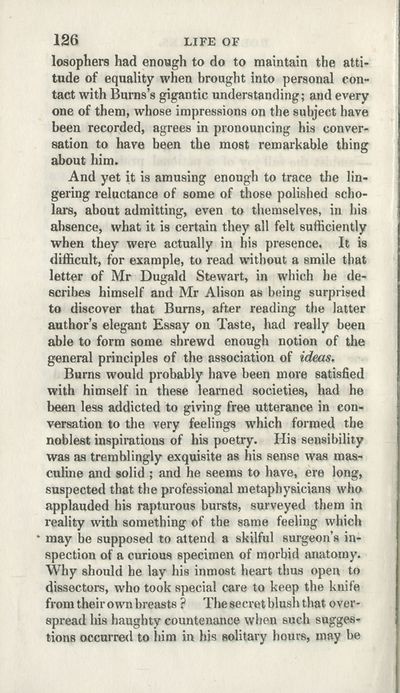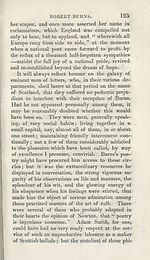Scotland/Scots > Life of Robert Burns
(136)
Download files
Complete book:
Individual page:
Thumbnail gallery: Grid view | List view

126 LIFE OF
losophers had enough to do to maintain the atti¬
tude of equality when brought into personal con¬
tact with Burns’s gigantic understanding; and every
one of them, whose impressions on the subject have
been recorded, agrees in pronouncing his conver¬
sation to have been the most remarkable thing
about him.
And yet it is amusing enough to trace the lin¬
gering reluctance of some of those polished scho¬
lars, about admitting, even to themselves, in his
absence, what it is certain they all felt sufficiently
when they were actually in his presence. It is
difficult, for example, to read without a smile that
letter of Mr Dugald Stewart, in which he de¬
scribes himself and Mr Alison as being surprised
to discover that Burns, after reading the latter
author's elegant Essay on Taste, had really been
able to form some shrewd enough notion of the
general principles of the association of ideas.
Burns would probably have been more satisfied
with himself in these learned societies, had he
been less addicted to giving free utterance in con¬
versation to the very feelings which formed the
noblest inspirations of his poetry. His sensibility
was as tremblingly exquisite as his sense was mas¬
culine and solid ; and he seems to have, ere long,
suspected that the professional metaphysicians who
applauded his rapturous bursts, surveyed them in
reality with something of the same feeling which
• may be supposed to attend a skilful surgeon’s in¬
spection of a curious specimen of morbid anatomy.
Why should he lay his inmost heart thus open to
dissectors, who took special care to keep the knite
from their own breasts ? The secret blush that over¬
spread his haughty countenance when such sugges¬
tions occurred to him in his solitary hours, may be
losophers had enough to do to maintain the atti¬
tude of equality when brought into personal con¬
tact with Burns’s gigantic understanding; and every
one of them, whose impressions on the subject have
been recorded, agrees in pronouncing his conver¬
sation to have been the most remarkable thing
about him.
And yet it is amusing enough to trace the lin¬
gering reluctance of some of those polished scho¬
lars, about admitting, even to themselves, in his
absence, what it is certain they all felt sufficiently
when they were actually in his presence. It is
difficult, for example, to read without a smile that
letter of Mr Dugald Stewart, in which he de¬
scribes himself and Mr Alison as being surprised
to discover that Burns, after reading the latter
author's elegant Essay on Taste, had really been
able to form some shrewd enough notion of the
general principles of the association of ideas.
Burns would probably have been more satisfied
with himself in these learned societies, had he
been less addicted to giving free utterance in con¬
versation to the very feelings which formed the
noblest inspirations of his poetry. His sensibility
was as tremblingly exquisite as his sense was mas¬
culine and solid ; and he seems to have, ere long,
suspected that the professional metaphysicians who
applauded his rapturous bursts, surveyed them in
reality with something of the same feeling which
• may be supposed to attend a skilful surgeon’s in¬
spection of a curious specimen of morbid anatomy.
Why should he lay his inmost heart thus open to
dissectors, who took special care to keep the knite
from their own breasts ? The secret blush that over¬
spread his haughty countenance when such sugges¬
tions occurred to him in his solitary hours, may be
Set display mode to:
![]() Universal Viewer |
Universal Viewer | ![]() Mirador |
Large image | Transcription
Mirador |
Large image | Transcription
| Antiquarian books of Scotland > Scotland/Scots > Life of Robert Burns > (136) |
|---|
| Permanent URL | https://digital.nls.uk/108247491 |
|---|
| Description | Thousands of printed books from the Antiquarian Books of Scotland collection which dates from 1641 to the 1980s. The collection consists of 14,800 books which were published in Scotland or have a Scottish connection, e.g. through the author, printer or owner. Subjects covered include sport, education, diseases, adventure, occupations, Jacobites, politics and religion. Among the 29 languages represented are English, Gaelic, Italian, French, Russian and Swedish. |
|---|

